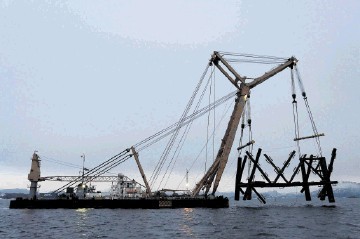
Since its inception in 2010, Decom North Sea has grown to more than 350 global members drawn from operators, major contractors, service specialists and technology developers, and plays a vital role in solution development and cross sector learning and is helping to build supply-chain capability.
Once a job that was considered “something for the future”, and overshadowed by the big money in exploration projects, decommissioning is now being viewed as opportunity. If this sector is not part of your company’s growth plans, it certainly should be.
With every month that passes, the interest in North Sea decommissioning grows. Understandably, the topic has been thrust into the spotlight as the oil price continues to challenge the North Sea industry and the organisation I lead – Decom North Sea – is about setting decommissioning within that context.
What is certain is that we are not advocating premature decommissioning, far from it. Our objective is to shift the decommissioning focus from that which springs to most minds – post-“Cease of Production”, and we’re shifting the focus for very good reason.
We’re paying close attention to the “Late Life” phase, ensuring it is managed as effectively as possible; in other words, we’re looking at what can we do now to benefit future decommissioning projects, while learning from previous decommissioning projects.
Within the oil and gas industry, it is clear that the desire is there to maximise UKCS economic recovery; maintaining existing infrastructure for as long as it remains efficient and cost-effective.
Equally, however, we recognise that now is the time to ensure our members understand – and become an integral part of – a robust decommissioning supply chain, making sure that they are ready for action, when the time comes.
To achieve this, our constant aim is to bring the regulators, operators and supply chain together. We help raise the profile of SMEs across the industry, facilitating their relationships with operators and providing an in-depth understanding of the late life and decommissioning scope and legislation. That is the key to ensuring decommissioning work will be undertaken in a timely – and cost-effective – manner.
Fundamental to that is the commitment to Late Life planning. We have developed the Late Life Planning Portal (L2P2) which provides the ultimate decommissioning toolkit: a repository for lessons learned, a forum for discussion and a gateway to contacts, analytics and market intelligence.
When an industry is in its infancy, a toolkit such as this provides fundamental support in achieving the overarching objectives of efficiency, simplification, standardisation and co-operation.
The portal launches at our lunch and learn on August 23, and I would urge anyone with an interest in, or knowledge of, late life and decommissioning to find out more.
Professionals like yourselves are the key to L2P2’s success and a UK decommissioning sector which provides the optimum level of opportunity.
Roger Esson is chief executive of Decom North Sea
Recommended for you
